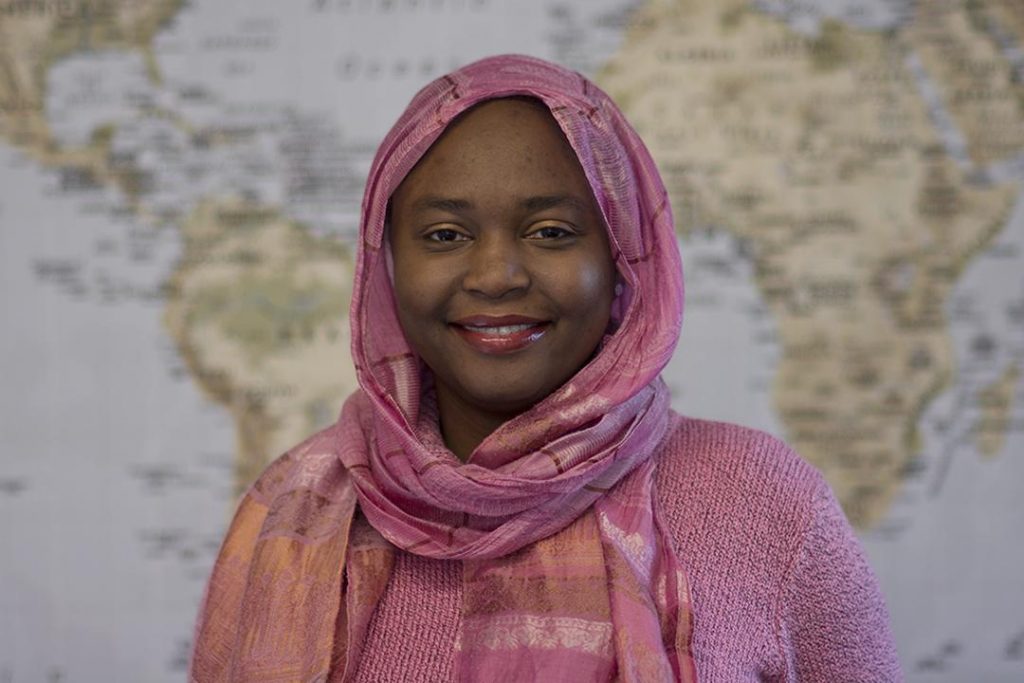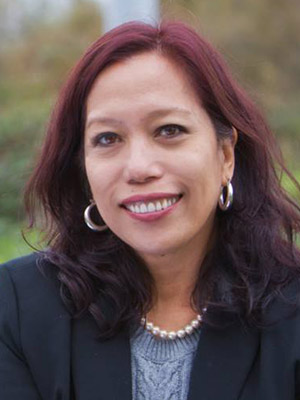On January 11th, 2024, the University of Washington held its 25th annual Martin Luther King Jr. Community Service Award ceremony honoring the work of Dr. King and celebrating exceptional community members who are committed to addressing community needs, improving the human condition, and protecting and empowering all individuals. This year, Rabi Yunusa was named an award recipient for her unwavering dedication to communities inside and outside of UW.
In-Depth Q&A with Rabi Yunusa

Rabi Yunusa is an assistant teaching professor of HSPop and DGH. In this Q&A, she shares her feelings on receiving this award and her message to the community.
Q: What does the MLK Jr. Community Service Award mean to you? How does it feel to be an awardee?
For me, it means recognition and validation. I feel like I’m not crazy, and that what I’m doing makes sense. It also means people see me as part of their community. I’m an immigrant and this is my 10th year in Seattle, so this is validation that the community has accepted me and is recognizing my value to the community as I recognize the endless value that they have to me. As an awardee, I feel so honored, yet I feel like I haven’t done enough. Because this is MLK, I feel like actions need to be widespread and I want to do things that have a big impact, but I know that what is important to people is what affects their lives every day.
Q: Based on your experiences working in Nigeria, Tanzania, and the US, and being born in Nigeria, how have those experiences shaped how you dedicate yourself to service, justice, and equity?
When you do work, especially in low-resource settings, very quickly it humanizes everybody for you. Seeing how everybody is different broadens your view of what is acceptable, and what it means to be of humanity. Once you can see those things, you can understand what social justice means. I remember starting to use the word social justice before I saw an actual definition of it. When I was in university, sometimes we would take the bus and I saw people who were working so hard but still chipping in to pay for people’s bus fares and trying to help each other. Then I would see someone who hasn’t done anything in their life in this nice car, uncaring about the people or the welfare of other people around them and I would just think this is not fair. Everywhere you go you can identify suffering and practice social justice by thinking: what can I do right now to elevate the situation? How can I use my own power and what I know to do something to uplift people from that situation.
Q: You are very involved in supporting students, faculty, and other communities both inside and outside of the School of Public Health. What motivates you to dedicate so much time and effort to helping others?
My ability to identify myself in my community and people that I meet is what drives me. I see myself in so many people. I’ve been fortunate and unfortunate to live through so many kinds of lifetimes and experience many kinds of things, so when I see somebody struggling, I empathize with that. I am seeing them; I’m identifying with them. I come from very humble beginnings, so I know the value of education. One of the occupational privileges of being a doctor is seeing and hearing from a lot of people. I feel I’m duty-bound to hold myself accountable to do something about that and live up to people’s trust in me.
Q: What are your hopes for the future?
I hope for a secure, safe and peaceful future so people can finally begin to live to the fullest. I believe that if people are not feeling secure and rested inside, they can’t ever do their best, it’s too hard. I feel like not everybody wants to be super rich or on a yacht or those things, people just want to exist and be allowed to do their little things. That’s what I want, to come out and feel peaceful and safe. I can feed my child and all the children in my neighborhood don’t go to bed hungry.
Q: Given that you’ve ran a successful weekly public health column in a national Nigerian newspaper, what’s the importance of having publicized community awards such as this one?
I think it makes it aspirational and brings visibility. It’s good to publicize in the age of social media because it brings exposure to young people and offers validation and empowerment. I suddenly have all these friend requests on LinkedIn and more opportunities for people to reach out to do things. There are days that you ask yourself, is what you’re doing even working? So, for people to tell you what you’re doing is valid and it’s touching lives is amazing and it made me feel so good. The name Martin Luther King Jr. comes with a universal consensus of saying yes to nonviolence, community, civil rights, freedom, and justice. It feels good that whatever little that I think I’m doing, I am doing it well because people are seeing it and they feel like, yes, I deserve to be on a platform and in the shadow of MLK Jr. I’m very proud of that. I guess I’m going to be proud of that for a long time or forever.
Q: What’s something you want the department to know about you?
I am from community. I am part of community. I value community-oriented work and I am going to continue along this route. I strongly believe that the only way to do public health is to connect academia and community. I want to bring community to the students, and I want to put the students in the community. If people are trying to do anything community-oriented; policy, work, research, or whatever, I want them to reach out to me and I will offer my efforts to the best of my ability. I am always willing to say yes to that.
I also want to recognize all the staff, faculty, students, and community partners that are enabling me to do this. Those who have been supporting me, advising me, pushing me, and given us the space to do the work. The students that trust me and are willing to open their minds. I’m very grateful to be able to do the work that I’m doing here. Thank you, UW SPH.
The Martin Luther King Jr. Community Service Award

“Even when you don’t think anyone can see what you’re doing, there are people in our community who are paying attention”
– Victoria Gardner
To offer more insight into the award itself, the School of Public Health’s Assistant Dean for Equity, Diversity and Inclusion Victoria Gardner shared her knowledge as someone who has served on the award committee for 20 years.
The award was started in 1999 as a way for UW Health Sciences and UW Medicine to celebrate the efforts of faculty, staff and students while intentionally building a space where we can celebrate community. The award is a part of the MLK Jr. Celebration event, a time to acknowledge each other’s presence and humanity and to honor people who are giving service above and beyond what they already do in the university. Awardees are considered via nominations, so this encourages community members across departments to talk and engage with each other.
“Health injustice is the biggest injustice of all” – Victoria Gardener
Health sciences has a history of health injustice and inequities and in this wide field, it’s important to create even the smallest of spaces to acknowledge the good work that people have done. Public health has a stigma of having less than healthy relationships with its communities, so to be able to highlight people like Rabi Yunusa who are very thoughtful in respecting and building healthy community relationships inspires us to think how each of us can contribute to public health in the vision of Dr. King.
Click here to learn more about Yunusa’s vision of community-based public health and how it shows through her work.